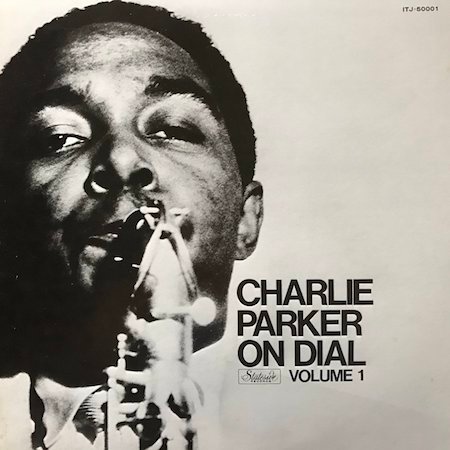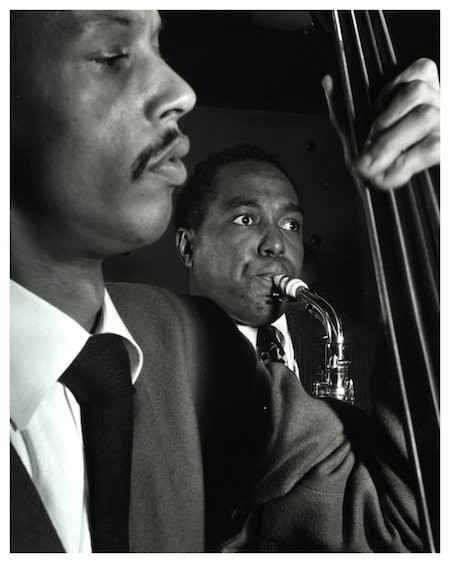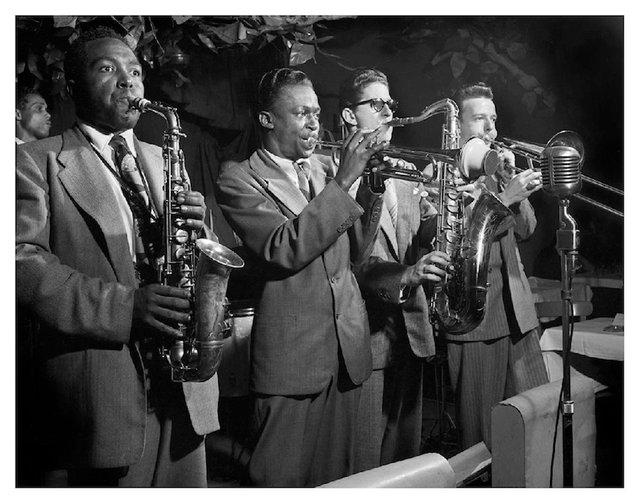Today in Jazz History: October 28th
Today in Jazz History:
Charlie Parker records two iconic performances of ‘Bird of Paradise’ and ‘Embraceable You’ for Dial Records on October 28th, 1947.

Album cover for Charlie Parker On Dial Volume 1, part of a reissue series by British label Spotlite Records in 1970.
On this day 71 years ago, Charlie Parker held a recording session in New York City for Dial Records which produced two of his most memorable and iconic performances - ‘Bird of Paradise’ and ‘Embraceable You’. Before we go any further, here are some details of the session in question, according to JazzDisco.org:
Tracklist:
- Dexterity (2 Takes)
- Bongo Bop (2 Takes)
- Dewey Square (a.k.a. Air Conditioning, Prezology)
- Dewey Square (2 Takes)
- The Hymn (a.k.a. Superman) (2 Takes)
- Bird of Paradise (3 Takes)
- Embraceable You (2 Takes)
Personnel: Charlie Parker (Alto Saxophone), Miles Davis (Trumpet), Duke Jordan (Piano), Tommy Potter (Bass), & Max Roach (Drums)
Though all the material here is worth discussing, we will focus specifically on the numerous takes of 'Bird of Paradise’ and ‘Embraceable You’. The majority of the tunes recorded for this session are energetic, uptempo numbers that exemplify the term which came to represent this style of jazz, bebop. The last two songs, however, are far slower and more relaxed than the rest. The first, titled ‘Bird of Paradise’, is based on the chord changes to ‘All The Things You Are’ (by Jerome Kern and Oscar Hammerstein II), a popular song from the ‘40s with an unusually complex harmonic progression that quickly became one of the most well-known standards in jazz history.
This concept of recycling the chords from another tune was a very common practice among jazz musicians during this era, as it allowed them to record their own interpretations of any song without having to pay copyright fees to the original composers. These types of compositions eventually became known as '[contrafacts]'(https://en.wikipedia.org/wiki/Contrafact) (Also, see this article for a running list of well-known jazz contrafacts). The tunes 'Dexterity' and ‘Dewey Square’ from this same session are also contrafacts - based on George Gershwin’s 'I Got Rhythm' and ‘Oh, Lady Be Good!’, respectively. However, in the case of ‘Bird of Paradise’, it is apparent that Parker did not compose a new melody in advance for this piece, instead he chose to simply make one up as he went along. It may sound daring but this was just business as usual for Charlie, a masterful improviser who frequently composed original tunes in a taxi on his way to recording dates. His impulsive personality may have actually helped him attain the remarkable improvisation skills demonstrated in these tracks, but his reckless behavior also precipitated his severe heroin and alcohol addictions which ultimately lead to his premature demise at the young age of 34.

Tommy Potter and Charlie Parker performing at The Three Deuces in New York City, August 1947. (Photo by William P. Gottlieb)
For this session, three takes of ‘Bird of Paradise’ were recorded, with the third and final one eventually being chosen as the master take for initial release. Intriguingly, on the first take, Charlie chooses to play the melody from ‘All The Things You Are’ quite plainly, but by the time he starts the third take (just minutes later), he has abandoned it altogether. Listening to all three takes consecutively is a fascinating experience, as you can literally hear the original melody gradually disintegrating with each successive take, and this gives us some significant insight into Parker’s creative process. He was constantly seeking to expand upon his previous musical ideas and themes, both in the trajectory of his career and also within his individual improvisations and performances. When comparing the three recordings, it certainly seems like the master take has captured Parker at his most expressive, as evidenced by the sheer elegance and unrivalled fluency displayed throughout his solo. In contrast to Parker’s powerful performance, the 21-year-old Miles Davis seems quite out of his depth, and his meek though acceptable playing reflects this. Similarly, pianist Duke Jordan’s solo is perfectly competent yet unsurprisingly, it still sounds uninspired compared to Parkers’. Luckily, Jordan’s comping throughout the rest of the tune is very tasteful and sparse, leaving plenty of space for Bird’s sublime improvisations.
Charlie Parker - Bird of Paradise (Take 3 - Master):
Spotify
Anecdotally, it is known that Charlie Parker was particularly fond of ‘All The Things You Are’, and he certainly played it frequently throughout his tragically short career. His fourth and final wife, Chan Richardson, was quoted as saying that Parker always referred to the song as ‘YATAG’, which was an acronym for his favorite line in the lyrics, “…You are the angel glow...”. Another interesting story related to this recording is the origin of the 8-bar motif which introduces all three takes of ‘Bird of Paradise’. At the start of 1944, Charlie Parker and longtime collaborator John Birks “Dizzy” Gillespie were both members of Billie Eckstine’s Orchestra, one of the first successful big bands to pioneer the bebop style of jazz. On April 13th,1944, Billy Eckstine and his band recorded three tracks (as ‘Billy Eckstine with the DeLuxe All Star Band’) for DeLuxe Records, one of which was a blues arrangement by Gillespie titled ‘Good Jelly Blues’. This recording includes the earliest known instance of this iconic introduction, although the rest of the Eckstine tune bears no similarity to Jerome Kern’s composition.
Billy Eckstine with the DeLuxe All Star Band - Good Jelly Blues:
Spotify
Incredibly, however, to find the true origin of this introduction, we have to go back more than 50 years prior to Billy Eckstine’s 1944 recording. The memorable three-note motif that appears in the introduction to Dizzy Gillespie’s arrangement of ‘Good Jelly Blues’ is actually a reference to the opening theme of Sergei Rachmaninoff’s classical composition ’Prelude in C# minor Op. 3, No. 2’, written and first performed in 1892.
Sergei Rachmaninoff - Prelude in C# minor Op. 3, No. 2:
Spotify
However, 'Bird of Paradise' was not the first recording of 'All The Things You Are' to feature this historic introduction vamp. On February 28th, 1945, Dizzy Gillespie and Charlie Parker both participated in a studio session for Musicraft Records (as the ‘Dizzy Gillespie Sextet’), which produced the first recorded version of ‘All The Things You Are’ to include the Rachmaninoff-inspired intro.
Dizzy Gillespie Sextet (Featuring Charlie Parker) - All The Things You Are:
Spotify
Although this recording precedes Parker’s 1947 Dial session by two years, the ‘Bird of Paradise’ version is far more well-known in the jazz world. Although Gillespie was not present at the October 28th record date, his recycled 8-bar introduction was immortalized that day, and even now many jazz musicians still use his iconic theme to introduce performances of Jerome Kern’s classic, 'All The Things You Are’. Up next are two takes of the George Gershwin ballad 'Embraceable You’ recorded by Parker during the same October 28th Dial Records studio session. Although both takes contain riveting Bird solos of comparable quality, the second recording ended up being used as the Master take, perhaps because it sounds slightly more lively and vibrant than the first.
Charlie Parker - Embraceable You (Take 2 - Master):
Spotify
On the first take, Charlie begins by using a technique called interpolation, which can be easily paraphrased as a ‘musical quotation’. Instead of playing the melody to ‘Embraceable You’ (which he almost entirely avoids on both takes), he interpolates the opening phrase of an entirely unrelated pop song from 1939, ‘A Table in A Corner’ written by a relatively obscure Kansas City musician Dana Suesse. Somehow Parker is able to make the combination sound entirely natural, and for the next 8 bars he continues to elaborate upon this spontaneous musical amalgam, twisting and reassembling the original motif until it is transformed into something new altogether.
Artie Shaw and His Orchestra (Featuring Vocalist Helen Forrest) - A Table In A Corner:
Spotify
Take two evidently showcases more of Charlie’s virtuosic technical abilities, as demonstrated when he suddenly launches into a rapidly ascending 32nd-note run occuring less than 30 seconds into the piece. This recording in particular puts Parker’s masterful rhythmic abilities on display, as he weaves in and out of the steady pulse provided by Tommy Potter and Max Roach's sympathetic accompaniment. Although bebop is generally known for its breakneck tempos, Bird’s talent really shines on slow ballads like ‘Embraceable You’, because he has more space to incorporate a more diverse set of rhythmic variations. In other words, he quite literally has more time between each beat to vary the manner in which he distributes his rhythmic ideas. The end result is that Parker’s phrasing in his ballad performances often conveys a stunning sense of discontinuity, giving the listener the impression that he might abruptly interject or displace the flow of his solo at any time. It’s no wonder then, that Parker’s solos on each take are drastically different, especially when compared to the young Miles Davis, who plays almost the exact same solo on both recordings. However, Miles still fares far better here than he does on ‘Bird of Paradise’, and his intimate, melancholy solo serves as a fitting foil to Bird’s strikingly ornate performance. At the end of Miles’ solo, both horn players join forces for a harmonised outro, coinciding nicely with a brushed drum roll from Max Roach to end the piece.

Charlie Parker, Miles Davis, Allen Eager, & Kai Winding performing at The Royal Roost in New York City, 1948. (Photo by Herman Leonard)
This concludes our debut article here at Gems of Jazz, and we sincerely hope you enjoyed reading about jazz history and the musicians who made it happen. Your support is very much appreciated, and we will continue striving to create more insightful content for our audience to enjoy.
Impressive article full of knowledge, facts and beautiful sounds. Couldn't listen to everything but after this comment I will remember to come back here again and continue with listening later next day :) I really love jazz, especially avant-jazz. Hope to hear something about it from you too :) Upvote and follow is obvious :)
Greetings !
Thank you for your support, there will be much more to come soon! :)
Congratulations @gemsofjazz! You have completed the following achievement on the Steem blockchain and have been rewarded with new badge(s) :
Click here to view your Board of Honor
If you no longer want to receive notifications, reply to this comment with the word
STOPDo not miss the last post from @steemitboard:
Congratulations @gemsofjazz! You have completed the following achievement on the Steem blockchain and have been rewarded with new badge(s) :
Click here to view your Board of Honor
If you no longer want to receive notifications, reply to this comment with the word
STOPDo not miss the last post from @steemitboard: